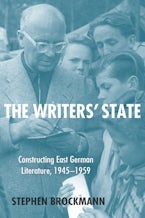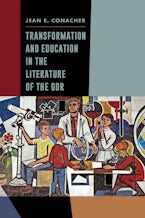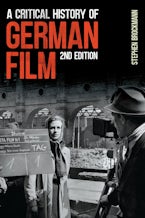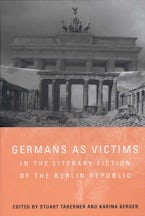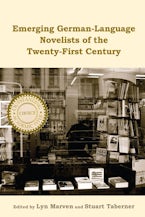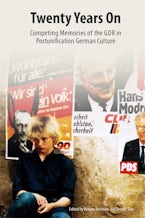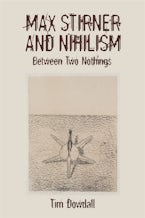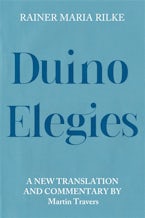
Title Details
352 Pages
22.8 x 15.2 cm
31 b/w illus.
Series: Studies in German Literature Linguistics and Culture
Series Vol. Number:
236
Imprint: Camden House
The Freest Country in the World
East Germany's Final Year in Culture and Memory
- Description
- Contents
- Author
- Reviews
- BLOG POST
Shows that while the GDR is generally seen as - and mostly was - an oppressive and unfree country, from late 1989 until autumn 1990 it was the "freest country in the world": the dictatorship had disappeared while the welfare system remained.
Stephen Brockmann's new book explores the year 1989/1990 in East Germany, arguing that while the GDR is generally seen as - and was for most of its forty years - an oppressive and unfree country, from autumn 1989 until the autumn of 1990 it was the "freest country in the world," since the dictatorship had disappeared while the welfare system remained. That such freedom existed in the last months of the GDR and was a result of the actions of East Germans themselves has been obscured, Brockmann shows, by the now-standard description of the collapse of the GDR and the reunification of Germany as a triumph of Western democracy and capitalism.
Brockmann first addresses the culture of 1989/1990 by looking at various media from that final year, particularly film documentaries. He emphasizes punk culture and the growth of neo-Nazism and the Antifa movement - factors often ignored in accounts of the period. He then analyzes three later semiautobiographical novels about the period. He devotes chapters to dramatic films dealing with German reunification made relatively soon after the event and to more recent film and television depictions of the period, respectively. The final chapter looks at monuments and memorials of the 1989/1990 period, and a conclusion considers the implications of the book's findings for the present day.
Stephen Brockmann's new book explores the year 1989/1990 in East Germany, arguing that while the GDR is generally seen as - and was for most of its forty years - an oppressive and unfree country, from autumn 1989 until the autumn of 1990 it was the "freest country in the world," since the dictatorship had disappeared while the welfare system remained. That such freedom existed in the last months of the GDR and was a result of the actions of East Germans themselves has been obscured, Brockmann shows, by the now-standard description of the collapse of the GDR and the reunification of Germany as a triumph of Western democracy and capitalism.
Brockmann first addresses the culture of 1989/1990 by looking at various media from that final year, particularly film documentaries. He emphasizes punk culture and the growth of neo-Nazism and the Antifa movement - factors often ignored in accounts of the period. He then analyzes three later semiautobiographical novels about the period. He devotes chapters to dramatic films dealing with German reunification made relatively soon after the event and to more recent film and television depictions of the period, respectively. The final chapter looks at monuments and memorials of the 1989/1990 period, and a conclusion considers the implications of the book's findings for the present day.
Acknowledgments
Introduction: The Memory of Freedom
1: Protocols of History: Reunification Documentaries from 1989/1990
2: Anarchy in the GDR
3: The National Liberation Zone
4: Coming of Age as the State Dies: Three Novels and Their Heroes
5: Provincial Theater: Fiction Film Struggles to Address German Reunification in the Early 1990s
6: The Grand Theater of the East and the Imaginary Stasi: The Emergence of the Standard Depiction of German Reunification in Film and on Television
7: Ritual, Repetition, and Memory: Commemorating and Memorializing 1989/1990
Conclusion: The Last GDR
Selected Works Cited
Filmography
Index
Introduction: The Memory of Freedom
1: Protocols of History: Reunification Documentaries from 1989/1990
2: Anarchy in the GDR
3: The National Liberation Zone
4: Coming of Age as the State Dies: Three Novels and Their Heroes
5: Provincial Theater: Fiction Film Struggles to Address German Reunification in the Early 1990s
6: The Grand Theater of the East and the Imaginary Stasi: The Emergence of the Standard Depiction of German Reunification in Film and on Television
7: Ritual, Repetition, and Memory: Commemorating and Memorializing 1989/1990
Conclusion: The Last GDR
Selected Works Cited
Filmography
Index
"The Freest Country in the World is a richly detailed and analytically acute book about 1989-1990 at the time in the GDR and in the memory of that time among both East and West Germans. I learned so much from every chapter: about novels, films, punks, neo-Nazis, the sausage-making of memorials." Donna Harsch, Professor of History, Carnegie Mellon University
"It is hard not to get quite dark in reflecting both on the missed opportunities of the 1989 revolutions, and on the way in which Western nations in a way exploited that moment to further impose a narrative of Western triumphalism. But instead of getting dark, I am inspired by this book to continue to think about promises and hope, and to use works of art and literature to inform how we recover possibilities rather than abandon them to the graveyard of history." Andreea Ritivoi, William S. Dietrich Professor of English and Department Head, Carnegie Mellon University
"[A]n admirable and useful synthesis." CHOICE
Hardcover
9781640141544
June 2023
£99.00 / $120.00
Ebook (EPDF)
9781805430377
June 2023
$29.95 / £24.99
Ebook (EPUB)
9781805430384
June 2023
$29.95 / £24.99
Title Details
352 Pages
2.28 x 1.52 cm
31 b/w illus.
Series: Studies in German Literature Linguistics and Culture
Series Vol. Number:
236
Imprint: Camden House

